Text
Anjasha al-Hadi
Birth : N/A
Nickname : Abu Mariyah
Ethnicity : Black
Occupation : Domestic servant
Religion : Islam
Gender : Gender non-confirming, Third gender
Sexuality : Queer
Death : N/A
Anjasha al-Hadi or Anjashah al-Aswad al-Hadi (Arabic: أَنْجَشَةُ ٱلْهَادِي) was a mukhannath individual during the time of the Islamic Prophet Muhammad (PBUH). Anjasha was assigned male at birth, but had feminine gender expression & used to mix with women. He/Ze had Ethiopian ancestry. Anjasha was also known as “Abu Mariyah/ Abu Maria”. The Arabic name Mariyah/Maria is feminine.
Anjasha/Abu Mariyah was served as a personal camel driver and domestic servant for Prophet Muhammad (PBUH) and had some responsibility of take caring the women of the Prophet's family. According to ahadith, Anjasha had a beautiful voice. While there are some claims suggesting that Anjasha was a sahabah of Prophet Muhammad (PBUH), he/ze is not widely recognized among muslims as a prominent sahabah.
Gender & Sexuality
Wathilah Ibn al-Aqsa confirmed that Anjasha/Abu Mariyah was a mukhannath. Abu Mariyah wasn't exclusively attracted toward women, this is why he/ze was allowed contact with women of Prophet's house. According to Al-Nasa'i, Anjasha had no sexual desires toward women.
References:
https://encyclopedia.pub/entry/33178
https://shamela.ws/book/9767/254
https://ar.m.wikipedia.org/wiki/%D9%82%D8%A7%D8%A6%D9%85%D8%A9_%D8%A7%D9%84%D8%B5%D8%AD%D8%A7%D8%A8%D8%A9
http://bit.ly/332cnjS
http://bit.ly/33R3GKa
https://bedayaa.org/wp-content/uploads/2023/02/Hadith-and-Queer-Identities.pdf
2 notes
·
View notes
Text
Muslim world's only mosque with Rainbow
I never imagine that there could be a mosque or masjid with a rainbow, especially in a conservative muslim-majority country. It can be a momentum for LGBTQIA+ muslims of Bangladeshi backgrounds to embrace the diversity of Allah. When I came know about this mosque, I was pretty shocked. It could be the only mosque in entire muslim world that has a vibrant rainbow minaret.
This mosque's name is Chawkbazar Shahi Jame Masjid, located in Chawkbazar, Puran-Dhaka. It was built by Emperor Shaista Khan. It is one of the oldest & largest mosques in Bangladesh. Guys, let me remind you of one thing: it is not a “LGBTQ+ friendly mosque." The mosque's rainbow minaret has also become a tourist attraction. It's ironic that the Bengali people living in this suburb have never had objections regarding the mosque's rainbow minaret. I think they are/were unaware of the symbolism of the rainbow, which stands for solidarity among queer and trans folks. BTW, there are some LGBTQI+ and hijra groups in the Puran-Dhaka suburb.
Homosexuality is a punishable offense in Bangladesh, under the British-inherited Penal Code Section 377. Hijras & kothis are visible queer individuals in South Asia. The South Asian term "hijra" refers to multiple genders, such as AMAB transgender individuals, transvestites, masculine women (intersex type), AMAB non-binary individuals, & intersex folks. The term doesn't include trans male. The term "kothi" specifically refers to transvestites, bottom gays, and effeminate males. Hijra community has existed since the early 10th century. In 2013, Bangladesh officially recognized hijras as a third gender. However, this subcultural gender minority still faces social stigma and discrimination.
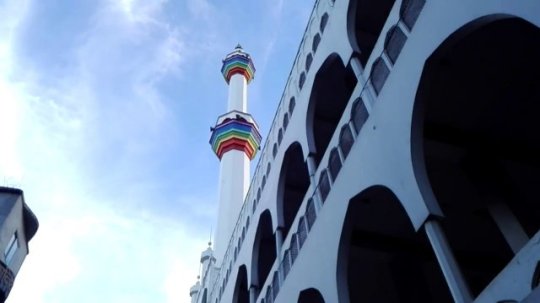
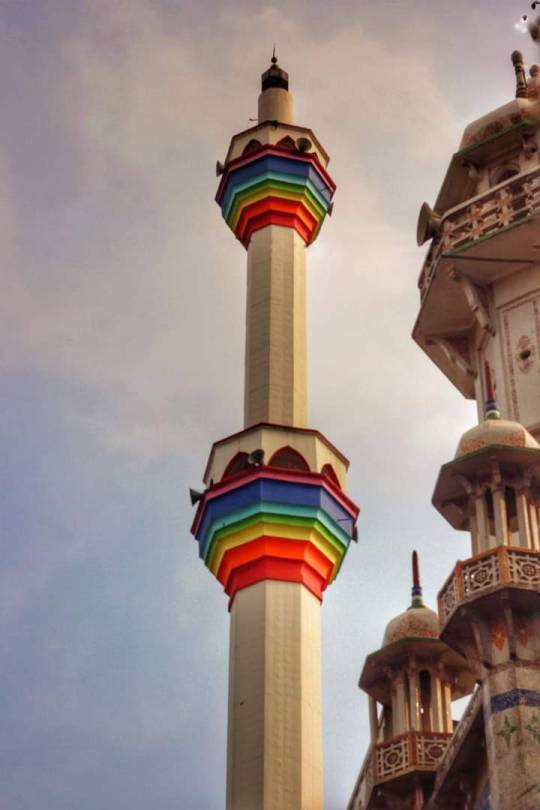

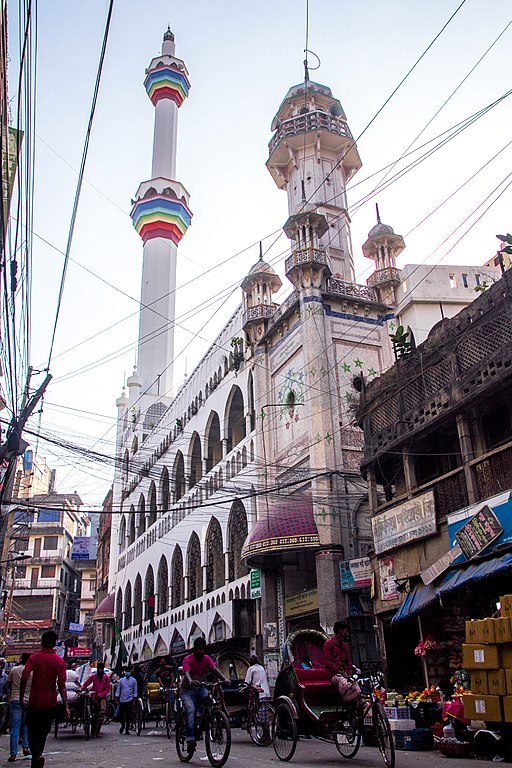

51 notes
·
View notes
Text
Mutarajila/Mutarajilla
Mutarajila/Mutarajilla/Mutarajilat is the masculine equivalent of “Mukhannath”. The Arabic term Mutarajila/Mutarajilat literally means AFAB who exhibits masculine characteristics, has masculine gender identity. In Arab-Islamic world it is used for tomboy & trans-masculine identities. Other variants of this term are Boyah/Boyat, Mustarjil/Mustarjal, Mustarajila, Ghulamiyat, Burnesha, etc.

Origin
The term may derived from the Arabic root word "tarajjul," which means "to become masculine" or "to exhibit masculine characteristics.
In Arabic cultures, Mutarajila/Mutarajilat/Mutarajjilun term is used to describe individuals who are assigned female at birth but express themselves in a more masculine or male-identified way. This can include behaviors, appearance, and gender identity that are not traditionally associated with femininity. In some Gulf states, Mutarajila/Mutarajilat are commonly known as Boyah/Boyat. They dress-up like a man, take masculine names for themselves, make relationship with femme woman.
9 notes
·
View notes
Text
Abū Abd al-Munim Īsā Abdallāh al-Dhaib (Tuwais)
Birth : 632 AD in Medina
Also known as : Taus, Tuways, Tuwais
Ethnicity : Arab
Occupation : Musician, Poet
Religion : Islam
Gender : Mukhannath/Queer
Sexuality : Gynesexual
Spouse : N/A
Death : 714 AD
Early life
Abū Abd al-Munim Īsā Abd Allāh al-Dhaib (also known as Taus, Tuwais) was born in 632 AD in Saudi Arabia. S/he was born on the same day when Prophet Muhammad (PBUH) died. S/he was weaned (aqiqah) on the same day when Abu Bakr was died. S/he had circumcision (Khatna) on the same day when Umar was assassinated. Tuwais was married when Uthmān was killed & his/her first son was born when Ali passed way. S/he was a mawlā of the Banū Mak̲h̲zūm, which was one of the wealthy clans of the Quraysh. When al-Dhaib joined the group of Mukhannathun, s/he changed his/her name into Tuways.
Career
Tuwais first attracted attention by singing melodies that s/he had learned from Persian captives. Sometimes s/he took a nickname for him/herself, something that only female singers did in early Arabia. S/he chose Tuways (means little peacock in Arabic) as his/her nickname. Ṭuwais is typically described as the “leading mukhannath musician during his lifetime.”
Tuwais was also being in the service of Arwā bint Kurayz, the (mother of the Caliph ʿUt̲h̲mān ibn ʿAffān). S/h rose to fame as a musician in the reign of Rashidun Caliph Uthmān ibn Affan. Uthman was tolerant of the mukhannathun, as long as they were practicing Muslims (which, by all accounts, they were). Tuwais reportedly was the first “great musician in earliest days of Islam” & “most influential mukhannath in early Arabia”. Tuwais had many disciples such as al-Dalal, Ibn Surayj, al-Gharīḍ, etc. S/he tutored Ibn Surayj, who became famous as the first muslim singer to successfully combine Persian and Hijaz music. According to musical literature sources, Tuwais and other mukhannath musicians enjoyed an exceptional visibility & prestige for a period of two generations.
Furthermore Ṭuwais and other mukhannath musicians formed an intermediary stage in the social class (mostly associated with musicians): women in pre-Islamic Arab, mukhannathun in the Rashidun Caliphates and early Umayyad Caliphates, & mainly non-mukhannath men in later time periods.
Persecution
In the later Umayyad period, mukhannathun faced widespread religious persecution, especially mukhannath/queer entertainers. Their lifestyles were declared unislamic during the reign of Caliph Marwan I . Most of them were forced to conform to cis-heteronormative lifestyle.
The first religious persecution of mukhannathun started at the reigns of Umayyad Caliph Marwan I. The governor of Mecca serving under al-Walīd I is said to have “issued a proclamation against the mukhannathun”, in addition to other entertainers. The most severe instances of religious persecution is typically dated back to the time of al-Walīd I's brother and successor Caliph Sulaymān ibn ʿAbd al-Malik, seventh Caliph of Umayyad dynasty.
According to several variants of this story, the transphobic caliph Sulayman ordered the full castration of Tuwais & other mukhannathun. Some versions of the tale say that all of them were forced to undergo the procedure, while others state that only a few of them were. Therefore, mukhannathun of Islamic Medina began to fade from historical sources, and the next generation of singers and musicians had few mukhannathun in their ranks.
6 notes
·
View notes
Text
Iranian Society to Support Individuals with Gender Identity Disorder
Type : Non-profit
Founder : Maryam Khatoonpour Molkara
Mission : Providing support for individuals with gender dysphoria, raising public awareness on GID/gender dysphoria, educating people about medical healthcare for trans community
Office : Tehran
Year of Foundation : 2007
Website : web.archive.org/web/ 20150419071221/http://gid.org.ir/
Iranian Society to Support Individuals with Gender Identity Disorder (Farsi: حمایت از بیماران مبتلا به اختلالات هویت جنسی ایران) is Iran's first & only legally registered organization for trans women,trans men & transsexuals. Iranian Society to Support Gender Identity Disorder was founded by Maryam Khatoonpour Molkara in 2007. The org. has clinicians, psychiatrists, psychologists & advocates . It's aim is to help those who faces legal and social challenges for their gender identity. However Association of Iranian Society to Support Individuals with Gender Identity Disorder does not acknowledge the transgender spectrum. They don't work with non-binary & gender non-confirming folks.
The org was registered for the first time in 2016 with the abbreviation GID with registration number 21996 in the form of a non-governmental organization (NGO) with the efforts of the late Maryam Khatun Molkara with the motivation of helping and supporting trans people. According to the articles of association, the members of the board of directors of this association are elected every 2 years from among the members of the target community and related professionals. Accordingly, in 2013 a regular general assembly was held and a new board of directors was elected, and the association restarted its work based on support, education and culture for the trans community and cis-people.
According to Iran's reference book (Diagnostic and Statistical Manual of Mental Diseases) DSM IV TR, transsexuality was known as gender identity disorder.According to the revision of this book, it was renamed with the new title of gender dysphoria or gender confusion or gender boredom. Since this change was applied after the date of registration of the official gazette of the organization.
4 notes
·
View notes
Text
LGBTQI+ rights in Somalia 🇸🇴
LGBTQIA+ people in Somalia face severe challenges, not faced by non–LGBTQI+ residents.LGBTQ+ rights are at the worst level in Somalia.LGBTQI+ Somalians are regularly prosecuted by the state and additionally face stigmatization among the broader population.
Legality of Homosexuality
Same-sex sexual activity is punishable by up to death (in areas controlled by Al-Shabab as well as in Jubaland).Homosexuality is also criminalised under the civil & local customary law in Somalia.
Discrimination,Violence
The U.S. Department of State's 2010 Human Rights Report noted that "there were reports of societal violence or discrimination based on sexual orientation.''
On 16 March 2013, a gay somali man was allegedly stoned to death by al-Shabaab. In 2016, an anonymous women rights activist somehow managed to flee somalia before her scheduled death penalty.When her sexual orientation was revealed by an acquaintance she faced much stigma and shame.
According to 2017 report by Australian Department of Foreign Affairs and Trade that ''LGBTQI+ people face numerous societal, cultural challenges as well as legislative barriers.On 10th January 2017, al-Shabaab announced that it had executed a teenage boy and young man in Middle Juba for engaging in sodomy.
The US Department of State 2020 report noted that, ''There were few reports of violence or discrimination against LGBTQ+ community. It did however cite anecdotal information which indicated that some families sent children suspected of being gay to reform schools.''
Recognition of Gender Identity
Somalia does not officially authorize a third gender or non-binary gender option. Furthermore, the right to change legal gender is also a topic considered socially taboo and that is not officially recognised nor outlawed by the state;this is due to a complete lack of recognition of gender identity struggles.
LGBTQI+ Association
Somali Gay Community was country's first advocacy rights group and support network for Somali Gay & Bisexual male community.
Somali LGBTQ is a community based organization fights for rights & freedom Somali LGBTQI+ of diaspora.
3 notes
·
View notes
Text
LGBTQI+ rights in Gambia 🇬🇲
LGBTQI+ Gambians expriences routinely discrimination, harassment, persecution in the Gambia, not exprienced by non-LGBTQ+ Gambians. There's no visible LGBTQI+ activism, nightlife in Gambia.

Legality of Homosexuality
Same-sex sexual activity is illegal for both males and females in the Gambia. Female same-sex sexual activity is a crime under the new amendment of Article 144 (since 2005). The 2014 Amendment of the Criminal Code of the Gambia introduced the punishment of so-called “Aggravated Homosexuality” with up to life imprisonment. [The amendment inserts Section 3 of Uganda’s Anti-Homosexuality Act into Section 144A of the Gambian Criminal Code].
In 2017, largest political party United Democratic Party (UDP) condemned the mass persecution of LGBTQI+ community. They also promised that they will decriminalize homosexuality in the country if their party is elected. But later UDP's leader Ousainu Darboe strongly condemned the idea of decriminalization of homosexuality.
The Amended Criminal Code of Gambia states that,
Article 144 (Unnatural offences):
(1) Any person who—
a) has carnal knowledge of any person against the order of nature; or
b) has carnal knowledge of an animal; or
c) permits any person to have carnal knowledge of him or her against the order of nature; is guilty of a felony, and is liable to imprisonment for a term of 14 years.
(2) Carnal knowledge of any person against the order of nature includes –
a) carnal knowledge of the person through the anus or mouth of the person;
b) inserting any object or thing into the vulva or anus of the person for the purpose of simulating sex, and
c) committing any other homosexual act with the person.
Article 144A (Aggravated homosexuality):
(1) A person commits the offence of aggravated homosexuality where the –
a) person against whom the offence is committed is below the age of eighteen;
b) offender is a person living with HIV Aids;
c) offender is a parent or guardian of the person against whom the offence is committed;
d) offender is a person in authority over the person against whom the offence is committed;
e) victim of the offence is a person with disability;
f) offender is a serial offender; or
g) offender applies, administers or causes to be administered by any man or woman, any drug, matter or substance with intent to stupefy or overpower him or her, so as to enable any person to have un-lawful carnal connection with any person of the same sex.
(2) A person who commits the offence of aggravated homosexuality is liable on conviction to imprisonment for life.
Article 147 (Indecent practices):
(1) Any male person who, whether in public or private, commits any act of gross indecency with another male person, or procures another male person to commit any act of gross indecency with him, or attempts to procure the commission of any such act by any male person with himself or with another male person, whether in public or private, is guilty of a felony and is liable to imprisonment for five years.
(2) Any female person who, whether in public or private, commits any act of gross indecency with another female person, or procures another female person to commit any act of gross indecency with her, or attempts to procure the commission of any such act by any female person with herself or with another female person, whether in public or private, is guilty of a felony and is liable to imprisonment for five years.
(3) In this section, ‘act of gross indecency’ includes any homosexual act.
History
The criminalisation of male homosexuality in the Gambia began in colonial era, when it was under British control as the Gambia Colony and Protectorate. The colonial Criminal Code (1933) of Gambia was implemented in 1934; its provisions, proscribing consensual sexual activity between males as "carnal knowledge against the order of nature" have remained in force to the present. Female homosexuality wasn't a criminal offense in colonial Gambia.
Amendments to the code have included changes to criminalise sexual behavior between women as "gross indecency" by the Criminal Code (Amendment) Act, 2005, and 2014 provisions dealing with "aggravated" homosexual offences that attract higher penalties, including life imprisonment, solitary confinement.
Same-sex unions, marriages
Gambia does not officially allow same-sex unions, marriages. Its considered a huge taboo in Gambian society. In past, religious leaders & clerics openly spoke against same-sex partnership & LGBTQ rights. In 2020, conservative religious leader Ebrima Sillah said in his friday sermon that “the gay marriage is happening every day in the country unknowingly [...]” However, there's no relevant evidence of same-sex wedding happened in Gambia.
Discrimination
The Gambia has no laws for protection of residents against discrimination based on sexual orientation, gender identity or expression, & HIV status. Homophobic Gambian President Yahya Jammeh fostered a hostile environment for LGBTQ+ residents during his presidency. He said that laws "stricter than those in Iran" against homosexuals would soon be introduced. He publicly vowed to "cut off the head" of any homosexual caught in the country. Since then Gambian police & national intelligence agency started targeting LGBTQI+ members of Gambia. Many were tortured during police custody, many fled the country to escape homophobic violence.
On June 2008, two Spanish gay men were arrested by Gambian police and detained at Kotu police station. On 23 December 2008, Frank Boers, a 79-year-old man from the Netherlands, was arrested at Banjul International Airport when officials found him in possession of pornography, including nude pictures of himself and some Gambian men. A Banjul court found Boers guilty of indecency with those men and sentenced him to pay 100,000 Gambian dalasis (£2,500) in lieu of a two-year prison sentence.
Former president Jammeh often gave anti-LGBTQ+ rhetorics in his speech. Notably, on 7 December 2009, Jammeh said, "We will not encourage lesbianism and homosexuality in the military. It is a taboo in our armed forces. I will sack any soldier suspected of being a gay or lesbian in the Gambia. We need no gays in our armed forces." He further advised the army chiefs to monitor the activities of every members and deal with soldier's homosexuality in the military.
According to 2011 US Department of State's Human Rights Report claimed that "there was strong societal discrimination against LGBTQI+ individuals, some of whom were shunned, although there were no reported incidents of physical violence against LGBT individuals during the year”.
On 9th April 2012, Gambian police arrested 18 gay men from a bar in the Tourism Development Area. They were charged with "indecent practice among themselves at a public place" According to police testimony in court, the arrests were made because 2 of them were "wearing women's cloth", carrying handbags, and "walking like ladies". Their names & pictures were shared in the local newspaper (without their consent). On 1st August of 2012, the court dropped all charges against them due to lack of evidence. According to the Gambian Daily Observer, two Gambian women and one Nigerian man were arrested on charges of indecent sexual practices in 2012. In 2013, President Jammeh rejected the LGBTI rights recommendations at the UN General Assembly. Further, he called for additional legislation to protect “so called traditional values & religious sensitivities” in Gambia. This led to the Gambian National Assembly unanimously passing the Aggravated Homosexuality Bill in August 2014, which was lifted word for word from the Ugandan Anti-Homosexuality Act. The word “aggravated” appears only in the title of the amendment, but as there is no definition for the terms used, it is unclear what this means. The law also states that those who commit acts of homosexuality as “serial offenders” will be subject to life imprisonment. The discriminatory nature of the new legislation & it's lack of clarity over application sets Gambia apart from other regional countries on LGBTQI+ issues. In 9th October 2014, he signed this new anti-LGBTQ legislation. In December, three men were charged with “engaging in homosexual activity” in violation of the Criminal Code’s “aggravated homosexuality” provision.
According to HRW Africa, the new law sparked a witch-hunt against LGBTQ+ people in Gambia, with at least 14 documented arrests. Some of them were tortured by police. Detainees said they were told that if they did not “confess,” and also provide the names of other so-called offenders, a device would be forced into their anus or vagina to “test” their sexual orientation. Some fled the country for the fear of punishment.
In 2014 ex-president Jammeh’s nephew, Alagie Jammeh's pro-LGBTQ post on Facebook that sparked nationwide controversy, he got death threats from his people. In 2017 he asked for an asylum in the USA because he feared arrest in Gambia.
In 17th May 2020, on the International Day Against Homophobia, Biphobia and Transphobia, EU delegation of Gambia uploaded pro-LGBTQ+ post, where they were urging to protect LGBTQ+ people. This sparked anger among religious & political leaders of Gambia. Many homophobic gambians gave anti-LGBTQI+ rhetorics against EU and LGBTQ+ community. In 2020, well-known human rights activist & faith leader Baba Leigh was slammed by conservative religious leaders for his egalitarian stance on homosexuality. He & his organization National Human Rights Commission were accused of promoting homosexuality & immorality in the country.
In July 2023, a Sierra Leonean fashion influencer named Victor Vickish Wilson was publicly harassed for crossdressing in Senegambia. He was dragged out of a vehicle by homophobic youngsters. He was accused of being ''gay''. Soilders of Senegambia harassed him, stripped his cloths. Some people made video of that & posted on social media. Eventually, he was detained in Banjul. The leader of the opposition Gambia Action Party (GAP), Musa Ousainou Yali Batchilly, opposed homosexuality in the Gambia.
Batchilly made these comments while reacting to a viral video of a man identified as Victor Vickish Wilson, a Sierra Leonean who was dragged out of a car a few days ago around Senegambia by a group of people including women for dressing like a woman.
He said a government led by GAP will accord zero tolerance to homosexuality and enforce maximum punishment to individuals found wanting.
In the video, Victor could be heard saying “I am not gay, I am a crossdresser.” While the attackers continued yelling at him, he tried to explain but the group weren’t interested in what he wanted to say. He added: “Why are you doing this to me?”
Mr. Batchilly also condemned the act while blaming the government led by President Adama Barrow for not enforcing laws that protect the cultural values in the country.
He said the video has triggered the violation of human rights cognizant of the fact that the majority of the Gambians are Muslims.
“All religious doctrines in the world abnegate this inhumane act.; the Gambia should not be an exception. The government has failed to protect the cultural rights and values of our nation since President Barrow ascended power due to selfish reasons,” he claimed.
Commenting further, the GAP leader promised to criminalize same-gender marriage or affairs to ensure that people with religious identities continually worship their beliefs without being dirty or filthy
Recognition of Gender identity
The Gambia does not allow citizens to change their legal gender. Since 2013, the country has criminalized gender expression under the Section 167 of the Criminal Code; cross-dressing is punishable by up to 5 years in jail or a fine of 50,000 Gambian dalasi.
In Wolof speaking communities, non-binary & effeminate males are known as gūrdigan or gordigen (means man-woman). Gūrdigan people are also found in Senegal & Mauritania. Most gūrdigans are born as male, few are intersex. Gūrdigan are very much associated with femininity. Historically they played role of
entertainers in various ceremonies, matchmakers between men and women.
LGBTQI+ Association, Activism
There are no public LGBT organizations in the country. Few LGBTQI+ rights groups, networks maintain a low profile in the country due to country's strict laws.
Hope Life International, an international org. based in the Gambia, aims to provide relief and support to those affected by poverty, disease, natural disasters, human rights violence & abuses. Hope Life International is a member org. of ILGA. Besides, HRW, Peace Corp, ACDHRS, Interfaith Diversity Network of West Africa (IDNOWA), UN High Commissioner for Human Rights, Gambian Human Rights Commission, West African Human Rights Defenders Network also defends rights of LGBTQI+ Gambians.
Yankuba Keita, a human rights activist based in Gambia, advocates for LGBTQ+ community. He also works with the African Centre for Democracy and Human Rights Studies (ACDHRS), which promotes awareness on human rights issues. Alajie Jammeh become beacon for LGBTQ+ community, when he spoke against Yahya's treatment of LGBTQ+ citizens. He also advocated for equal rights of LGBTQ+ community. For his LGBTQ+ activism, Alajie risked his life, got death threats. He was shunned by his family, relatives & friends. Even Gambian government officials threatened him to revoke his scholarship, if he returned home.
Mohammad Sonko is a Canada-based LGBTQ+ activist who advocates for rights of LGBTQ+ people. Sonko is reportedly the first gambian who came out as gay in Brikama, Gambia. He was persecuted for being gay in his home country, later he took refuge in Canada.
Summary:
Same-sex sexual activity - ❌
Equal age of consent - ❌
Recognition of same-sex unions,marriages - ❌
Anti-discrimination laws in the provision of goods and services - ❌
Anti-discrimination laws in all other areas (Incl. indirect discrimination, hate speech) - ❌
Anti-discrimination laws in employment only - ❌
Right to change legal gender - ❌
LGBTQ+ people allowed to serve openly in the military - ❌
MSMs allowed to donate blood - ❌
6 notes
·
View notes
Text
LGBTQI+ rights in Senegal 🇸🇳
Senegalese LGBTQ+ citizens has to exprience legal & social challenges, not exprienced by non-LGBTQ+ citizens. In Senegal, homosexuality & sex outside the traditional marriage is a punishable crime.
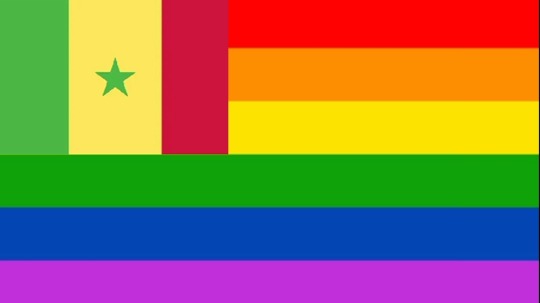
Legality of Homosexuality
Same-sex sexual conducts between men & between women are illegal in Senegal since 1966.There's no equal age of consent.
Article 319 in the Senegalese Penal Code states,
Without prejudice to the more serious penalties provided for in the preceding paragraphs or by articles 320 and 321 of this Code, whoever will have committed an improper or unnatural act with a person of the same sex will be punished by imprisonment of between one and five years and by a fine of 100,000 to 1,500,000 francs. If the act was committed with a person below the age of 21, the maximum penalty will always be applied.
Same-sex unions
Same-sex unions,marriages are not recognized by the state. Senegalese society sees same-sex relationships & unions as a deviation of west.
In 2008, Icone magazine reported about an alleged gay marriage that had taken place in Senegal. The wedding's photographs created an outrage among public.
Adoption
According to 2011 United States Department of State's report, “a (heterosexual) married couple for a minimum of 5 years or an unmarried person who is at least 35 years of age is eligible to adopt a Senegalese child if there is at least 15 years between the age of the child and the age of the adopting parent.”
There is a probability that a single homosexual/bisexual person may adopt a child, because the state do not specifically ban adoption by a homo/bisexual person. We don't know about transgender & intersex persons.
Public Opinion
According to the 2013 Pew Global Attitudes Project, 97% of Senegalese people believed that homosexuality should not be accepted by the society.
Discrimination
LGBTQI+ people in Senegal face widespread discrimination, violence & social stigma. According to local human rights groups, LGBTQI+ people usually face harassment by police and ill-treatment in prison.
In February 2008, five men were arrested for an alleged gay wedding; but later they were released without charge.This incident stirred a mass public outrage. On 19 December 2008, nine men were arrested on charges of homosexuality in a private flat in Dakar. One of the arrestees was Diadji Diouf, the owner of the flat and president of the association AIDES Senegal. The detainees were repeatedly tortured while in the police custody. On 6 January 2009, they were convicted of "indecent conduct and unnatural acts" and for "being members of a criminal group". The senegalese judge said that, AIDES Senegal was a "cover to recruit or organize meetings for homosexuals, under the pretext of providing HIV/AIDS prevention programmes". The Court of Appeals overturned the convictions in April 2009 and ordered the immediate release of the detainees. While incarcerated, the nine were held in special quarters because of threats from other inmates. Shortly thereafter, conservative religious leaders & member of parliament Mbaye Niang organized a march against homosexuality. In the mid-2009, Senegalese islamists and homophobes created the Front islamique pour la defense des valeurs éthiques (English: The Islamic Front for the Defense of Ethical Values), advocated for the death penalty of queers.
There were multiple reports around the same time, in which bigot people digging up the bodies of deceased "goor-gigen" (a Senegalese term for transgender, gender non-confirming) in cemeteries. Local and international press reported in May 2009 that the corpse of a goor-gigen man reputed to have been homosexual was twice disinterred from a muslim cemetery in Thies. The first time, the body was left near the grave. After his family reburied him, the body was disinterred a second time and dumped outside his family's home.
In March 2010, the United Nations Working Group on Arbitrary Detention found that Senegal's National Police had detained persons who were alleged to have committed "unnatural sexual acts". The group recommended that Senegal, "Pay particular attention to detentions on the grounds of offending decency or public morality, with a view to avoiding any possible discrimination against persons of a different sexual orientation" In December 2012, a gay couple was viciously beaten near Dakar by one of the men's parents.
In 2016, Senegalese President Macky Sall denied to decriminalize anti-gay law. He said: "Never, under my authority, will homosexuality be legalized in the Senegalese lands."
Gender Identity
Senegal do not allow trans people to legally change their gender. There's no non-binary or third gender option for gender variants.
Gūrdigan (means man-woman in wolof) is a gender variance folk in Senegal,Mauritania, Gambia. Many of them converted to Islam, when Islam came to Africa. Most gūrdigans are born as male, few are born as intersex. Gūrdigan present themselves in very feminine way & play the feminine gender role in their communities.Historically, they played a role of
entertainer in marriage ceremony, other cultural occasions, & matchmakers between men and women. But nowadays they face widespread stigma & hostility in Senegalese society.
Summary:
Same-sex sexual activity - ❌
Equal age of consent - ❌
Recognition of same-sex unions,marriages - ❌
Anti-discrimination laws in hate speech and violence - ❌
Anti-discrimination laws in the provision of goods and services - ❌
Anti-discrimination laws in employment - ❌
Adoption by LGBTQI+ person - ✔️/❌ [ambiguous]
Right to change legal gender - ❌
LGBTQ+ persons allowed to serve openly in the military - ❌
MSMs allowed to donate blood - ❌
7 notes
·
View notes
Text
LGBTQI+ rights in Guinea 🇬🇳
LGBTQI+ Guineans often face legal & social challenges.Homosexuality & gender variance wasn't a crime in Africa until 19th century. Government of Guinea strongly opposes rights of LGBTQI+ citizens.
Legality of Homosexuality
Both male and female same-sex sexual activity is illegal since 1988.
Same-sex Unions
There's no legal recognition of same sex unions in Guinea. People considers non-heterosexual relationships “immoral” & do not tolerate queer relationships.
Anti-discrimination
There's no law that protect people from discrimination on the basis of their sexual orientation,sex characteristics & gender expression.
Recognition of Gender Identity
There's no legal recognition of third gender or sex & right to change one's legal gender.
Dogon ethnic people has gender variance practices. They also recognize trans & non-binary identities. Bambara ethnic people also has understanding of gender non-confirming individuals. From the beginning Bambaras believed that god is androgynous or gender non-confirming.
LGBTQI+ Association, Activism
There's no openly LGBTQI+ organizations, rights groups in Guinea.
Summary:
Same-sex sexual activity - ❌
Equal age of consent - ❌
Recognition of same-sex unions - ❌
Adoption by LGBTQI+ person - ❌
Right to change legal gender - ❌
Anti-discrimination laws in all other areas (including indirect discrimination, hate speech ) - ❌
Anti-discrimination laws in the provision of goods and services - ❌
LGBTQI+ persons allowed to serve in the military - ❌
MSMs allowed to donate blood - ❌
1 note
·
View note
Text
Muhsin Hendricks
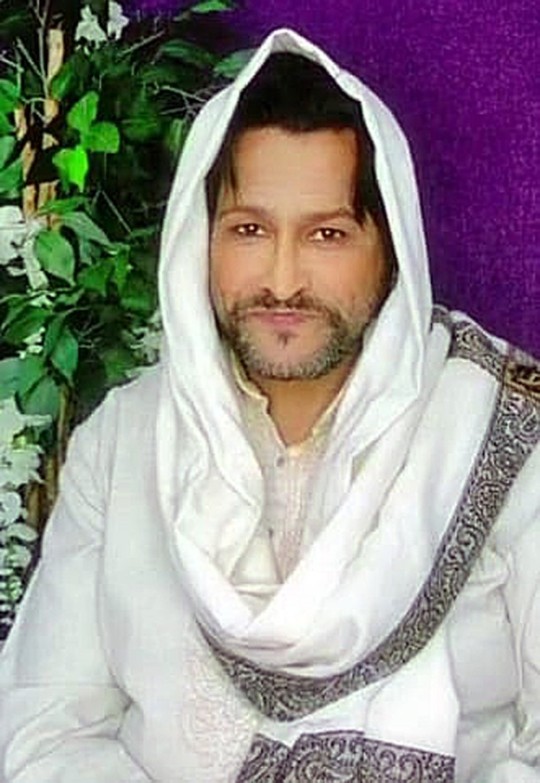
Birth : Unknown
Ethnicity : South Asian, African
Alumni : University of Islamic Studies, Karachi (1990-1994)
Gender : Cisgender man
Sexuality : Homosexual
Occupation : Imam, scholar, human rights activist, interfaith activist
Muhsin Hendricks is an Islamic scholar, researcher & human rights activist.He is called world's first Gay Imam. He has done independent research on Islam and sexual diversity, an area that does not often get explored in the Muslim/Islamic world. He has also delivered many papers and facilitated workshops on Islam and Sexual Diversity to many organizations in South Africa, USA and Europe. Muhsin is founder of The Inner Circle/Al-fitrah Foundation, the largest organization for LGBTQI+ Muslims in Africa & CCI Network, a network of inclusive muslims, faith leaders & activist. He founded the first gender-affirming, queer-friendly mosque in South Africa (the mosque is affiliated with organization Al-fitrah Foundation).
#gaymuslim#gay indian#gay africa#queer muslim#lgbtqi muslims#homosexuality in islam#progressive muslim#inclusive islam#gay imam#queer africa#interfaith#intersectional#queer affirmating#queer mosque#homosexuality and islam
74 notes
·
View notes
Text
Hidayah (Organization)

Type : Charity
Founder : Shelina
Mission : Provide support and welfare for LGBTQI+ Muslims,promote social justice for LGBTQI+ muslims.
Year of foundation : 2017
Website : www.hidayahlgbt.com
Hidayah is UK & US-based charitable org. for LGBTQIA+ Muslims.Hidayah run social and support groups in Manchester, London, Newcastle, Glasgow and Leeds.The org. also campaign for the visibility of LGBTQI+ Muslims,QPoC and work on educational projects and research to highlight the voices of LGBTQI+ Muslims in the UK & USA. Hidayah's members also participated in several pride events in UK.
Primarily the organization started as a social & support group for LGBTQI+ muslims in UK. Shelina, a bengali queer muslim woman & her muslim friends started the org. in 2017. Hidayah LGBT+ opened their branch in USA in 2020.
4 notes
·
View notes
Text
Adam Yosef

Birth : 1981
Occupation : Journalist,LGBTQ+ Activist
Gender : Male
Ethnicity : South Asian, Arab
Sexuality : Pansexual
Religion : Islam
Adam Yosef is a British journalist, photojournalist,LGBTQI+ activist and political activist.He is co-founder of the Stand Up To Racism Birmingham Chapter, Birmingham Against LGBTQI+ Hate, & organiser for Stop the War Coalition.
Yosef has regularly written for the BBC, creating content highlighting issues of socio-politics,diversity,culture,racism and religion.He has also written for the Birmingham Mail,The Forward,IlmFeed, etc. His work also has been featured in The Washington Post, The Mirror and Al-Jazeera.
Yosef is a former member of the Respect Party, campaigning for the party in Birmingham,UK.He supported the Green Party of England and Wales in October 2009.
Early life
Yosef was born in September 1981 in Marston Green,England to a religious muslim family.He is of South Asian and Middle Eastern heritage, with family from India, Kashmir and Iraq.
Career
Public media career
Between 2003 and 2004, Adam Yosef was employed by the Birmingham Central Mosque as a Press & Public Relations representative.He regularly appeared as spokesperson for the trust alongside its chairman, Dr Mohammad Naseem.From 2005, he was Press Officer for politician Salma Yaqoob, the former leader of the Respect Party.He was also Press & Social Media Officer for Salma Yaqoob during the 2010 general election.
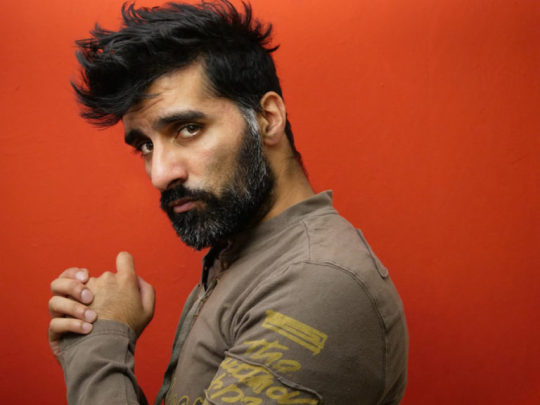
Between 2005 and 2006, Yosef was senior journalist with The Asian Today & Desi Xpress.In 2007, Yosef was appointed deputy editor of national entertainment magazine Ikonz.In 2008, he became a columnist for Fusian magazine. In July 2009, Yosef launched I Am Birmingham, an independent news website serving the West Midlands region, of which he was an editor-in-chief.
In October 2019, public letters written by LGBT+ Labour & LGBT+ Labour West Midlands accusing West Mayoral candidate Salma Yaqoob for homophobia, included claims Adam Yosef was previously employed by Yaqoob and had "called for violence against LGBT+ activists".The letters were shared and endorsed by Labour MPs Wes Streeting & Ben Bradshaw.Then Salma Yaqoob defended her relationship with Yosef, stating: "Adam is a member of the LGBTQI+ community and is an active campaigner for LGBTQ+ rights, who was pivotal in promoting Muslim groups' involvement in Birmingham Pride."Yaqoob's responses to the points made in the letters were backed by LGBT+ activists Owen Jones,Saima Razzaq, Pav Akhtar, who described Yaqoob as an ally.LGBT+ Labour West Midlands has since removed the original letter from their Twitter account.
Activism
In 2003, Yosef co-founded the interfaith Saltley Gate Peace Group, a community peace initiative which was formed in response to the threat of war in Iraq as a part of the growing peace movement in Britain following 9/11, and he was Community & Interfaith Liaison Officer for the Birmingham Stop the War Coalition during this period.He has been actively involved in community work which is related to the Lozells riots, the Alum Rock terror raids & campaigning against radical groups in the Midlands.
In his early twenties, Yosef slept rough on the streets of London before being assisted by The Salvation Army. As a result, founded the Birmingham Food Drive in 2012, which regularly provides food, clothes and essential items to homeless people in the city, and is an active supporter of youth homelessness charity St. Basils.He has also written for Pavement, the magazine for the rough sleepers in the UK.
Between 2011 and 2017, Yosef co-organised the Birmingham Zombie Walk, an annual event which raised thousands of pounds for Birmingham Children's Hospital, as part of an ongoing commitment to the charity.In 2015, Yosef co-founded the Birmingham chapter of the national anti-racism organisation Stand Up To Racism.
In 2021, Yosef co-founded Birmingham Against LGBTQI+ Hate, alongside queer muslim activists Saima Razzaq & Salman Mirza.The group organises rallies against homophobic attacks in the city and has called on city leaders to facilitate better relationships between communities.
Honours
In November 2017, Yosef was nominated & shortlisted for the Inspirational Man accolade at the Birmingham Inspiration Awards.In September 2018, Yosef was nominated & shortlisted for the Excellence in Media accolade at The Birmingham Awards. In 2019 and 2021, he was nominated in the Positive Role Model (LGBT) category for the National Diversity Awards. In 2020, Yosef was presented with an honorary award for 'Outstanding Contribution to LGBTQ+ Equality' award by Midlands Zone magazine.
2 notes
·
View notes
Text
Khanith
Khanith/Xanith (Arabic: خنيث) is a gender-diverse community of Arabian peninsula. Most of the Khaniths are born as male, associated with feminine expression & gender non-confirmity. The term khanith is colloquially used in Oman and other parts of the Arabian Peninsula to describe effeminate male, transvestite, passive homosexual, queer, gender non-confirming & non-binary individuals.
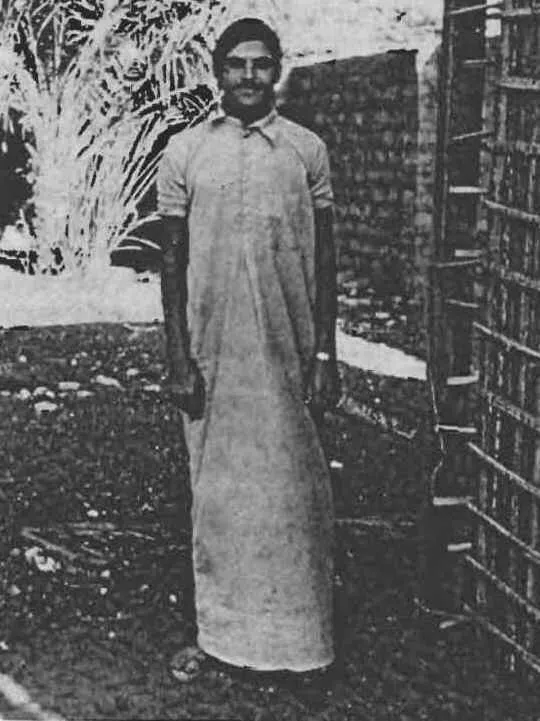
Etymology
The term khanith derived from the Arabic triliteral root kha-nu-tha — a root which also provides the words khuntha (intersex) and mukhannath/mukhannas (effeminate male, trans femme,cross-gender). Mu'khanith is the plural form of Khanith. The term Khanith/Mukhanith has been existed in Arabian Peninsula since about 600 AD. [citation needed]
The term khanith was first documented in anthropological scholarship by Unni Wikan (1977). Unni Wikan described Khanith group as transsexual homosexual [citation needed]. Wikan’s study proved to be controversial among anthropologists, triggering a heated debate about definitions and methodology of Arabic Khanith identity.
Life Style
The Khanith has medium long hair & comb their hair diagonally forward from a side parting, and they oil it heavily in the style of women. Both men and women cover their head, but Kaniths do not.Khaniths are generally heavily perfumed, and uses make-up.They often dressed up in a white and tight-fitting kandorah (an ankle-length garment worn in the region), while some worn ghutrah (a white headdress). By profession, khaniths are entertainer, matchmaker & servant.
In legal terms the khaniths are regarded as men and referred to by others with masculine pronouns. While some consider them as third gender in Omani society. Some khanith may marry a female, by doing so they would be bound by the rules of patriarchal norms & gender segregation. The usual reason given for marriage is to have someone care for them and keep them company in old age. Moreover, khanith individuals can engage in same-sex relationship, their sexuality was much tolerated in earliest days of Arabia.
In Popular Culture
The Diesel is one of the popular critical pieces of Gulf literature, was written by Thani al-Suwaidi, an Emirati poet & writer. The novella was published in 1994. The story revolves around a transgender/khanith djinn who face the difficult decision of living in a man's body as a conventional 'man' or embracing their inner female soul. Diesel is born to parents who long for a son after many pregnancy difficulties. The mother passed away after giving birth. The father and family hold Diesel responsible for her/their mother's death & ultimately marginalised growing up in her/their community. Eventually, she/they experiences a 'calling' and takes on a daring career as a female entertainer and singer. She/they becomes the most sought-after voice luring sheikhs who beg to hear her voice at their celebrations and weddings. Eventually, Diesel's popularity grows to the extent that she/they is able to incite a rebellion against the ruling elite.
4 notes
·
View notes
Text
Köçek (Turkey)
Köçek was a young effeminate, gender non-confirming person who cross-dressed in feminine attire, and was employed as an entertainer.Köçeks were recruited of several background and ways, such as by captives, slaves or devşirme (recruiting of boys from the Janissary corps) from the fourteenth to early eighteenth century.The culture of the köçek, which flourished from the 18th to the 19th century, had its origin in the customs in Ottoman palaces, & in particular in the harems.
A köçek would begin training around the age of seven or eight after he was circumcised and would be considered accomplished after about six years of study and practice. A dancer's career would last as long as he was clean shaven and retained his youthful appearance.The dances, collectively known as köçek oyunu, blended elements from throughout the empire, most importantly Turkish (like Karsilamas & Kaşık Havası) and oriental elements. They performed to a particular genre of music known as köçekçe, which was performed in the form of suites in a given melody.It too was a mix of Sufi, Balkan and Classical Anatolian influences. The accompaniment included various percussion instruments, such as the davul-köçek, the davul being a large drum, one side covered with goat skin and the other in sheep skin, producing different tones. A köçek's skill would be judged not only on his dancing abilities but also on his proficiency with percussion instruments, especially a type of castagnette known as the çarpare.The dancers were accompanied by an orchestra, featuring four to five each kaba kemençe and laouto as principal instruments, used exclusively for köçek suites.There were also two singers. A köçek dance in the Ottoman seraglio (palace harem) involved one or two dozen köçeks and many musicians.The occasions of their performances were wedding or circumcision celebrations,feasts & festivals, as well as the pleasure of the sultans and the aristocracy.
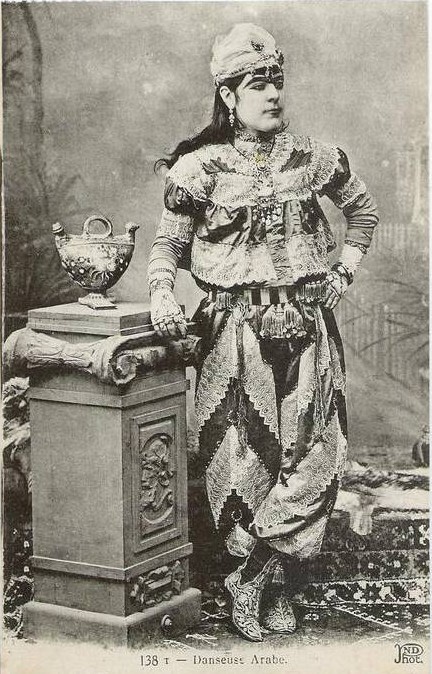
Portrait of an Ottoman Kocek
Koceks, often wearing heavy make-up, would curl their hair and wear it in long tresses under a small black or red velvet hat decorated with coins, jewels and gold. Their usual garb consisted of a tiny red embroidered velvet jacket with a gold-embroidered silk shirt, shalvar (baggy trousers), a long skirt and a gilt belt, knotted at the back. They were said to be "sensuous, attractive, effeminate", and their dancing "sexually provocative". Dancers minced and gyrated their hips in slow vertical and horizontal figure eights, rhythmically snapping their fingers and making suggestive gestures. Often acrobatics, tumbling and mock wrestling were part of the act.Köçek dance was performed in public spaces such as marketplaces,coffee houses,taverns & wine cellars.
Education was also provided to the köçek at enderȗn mektebi (the school of the palace) and only some were chosen to live in the inner part of the sultan’s palace. Others resided elsewhere and worked in the kol (in the guilds of craftsmen).
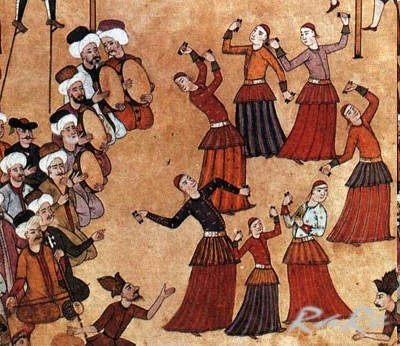
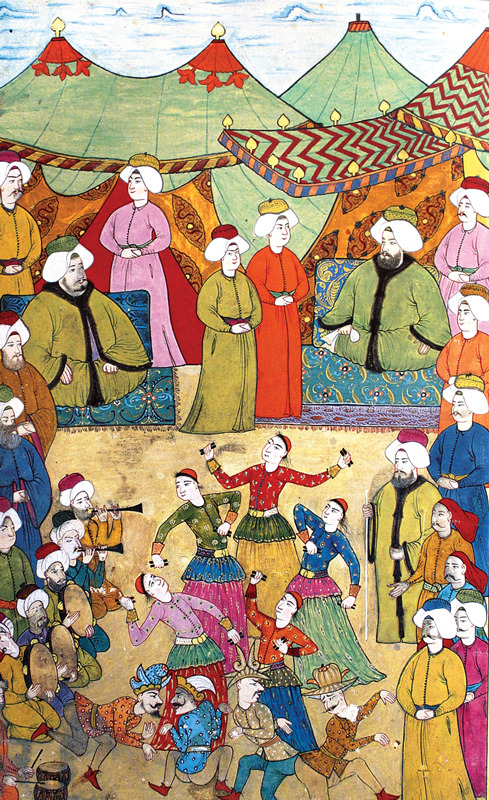
Decline
Despite its popularity, the kocek dance was controversial within Ottoman conservative religious and political leaders viewing it as immoral. As of 1805, there were approximately 600 köçek dancers working in the taverns of the Turkish capital.They were outlawed in 1837 due to fighting among audience members over the dancers.With the suppression of harem culture under Sultan Abdulaziz & Sultan Abdul Hamid II, köçek dance and music lost the support of its imperial patrons and gradually disappeared.Some köçeks dispersed to Anatolia and various Arab countries.
In Popular Culture
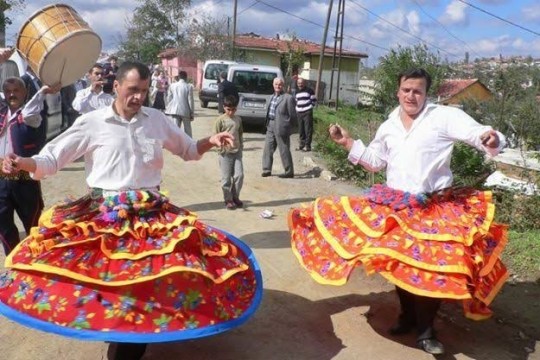
Today, the kocek dance is largely a historical artifact, although there are some efforts to revive the dance as a form of cultural heritage.The köçek dance exists in some parts of Anatolia, especially in the Kastamonu.Köçek boys are also sometimes referenced in popular culture, & has been featured in films, novels and other works of art that explore the history and culture of the Ottoman Empire.
There is a turkish movie Kocek, directed by Nejat Saydam.The movie follows the life of Caniko, a gender non-confirming gypsy, who struggles with his gender identity.
7 notes
·
View notes
Text
Act of Faith (2003)
Director - Dan Bree
Producer - Dan Bree
Cast - Kyriel, Iftekhar, Arslan
Genre - Documentary
Length - 7 minutes
Country of origin - USA
Year of release - 2003

Act of Faith is a short documentary directed by Dan Bree.In this short, three men explain that there is no unequivocal answer to the question of whether homosexuality and Islam are compatible.The documentary was also screened in Amsterdam's International Documentary Film Festival[citation needed]
Synopsis
In this short, traditionally composed documentary, Imam Iftekhar is one of the three men expressing their standpoint – arduously acquired or not – on Islam and homosexuality.But although Iftekhar represents the established opinions, he feels the time has come to review the interpretation of the Koran, in the light of what is happening today and what is now considered normal.
Kyriell, gay muslim & an Imam’s son, struggled a long time with his love for both Islam and men. At first, Kyriell believes there's no place for him in the religion.But years of soul-searching led him back to the faith.On the contrary, Arslan, an ex-muslim, rigorously threw religion overboard.He believe that if someone is a muslim, he/she should live their life according to the ruling of Islam.One can't be mutually queer and muslim, and must give up their feelings.
#queer#queer muslim#homoseuxality#homosexuality in islam#gay muslim#documentary#islam#faith#black#QTPOC#ex muslim
5 notes
·
View notes
Text
Imaan (Organization)
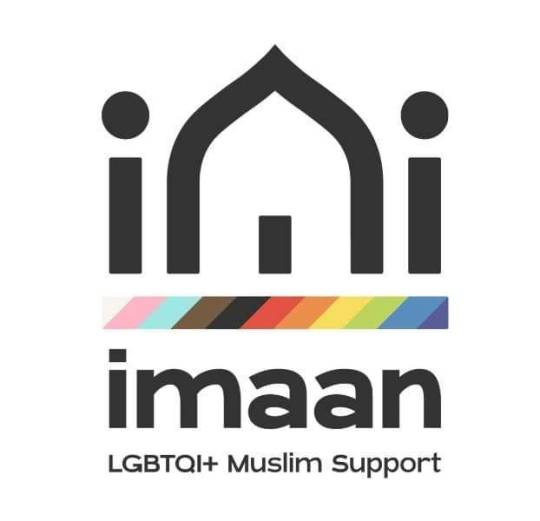
Type : Non-profit
Founder : Adnan Ali,Faizan Fiaz/ Farzana,Azeem Ahmad,etc.
Services : Provides counseling, peer-support, safe space for praying, build interfaith relations,etc.
Country : UK
Year of foundation : 1998
Website : www.imaan.org.uk/
Imaan is UK's leading LGBTQI+ Muslim organization.As the leading organisation working for the rights and support of LGBTQI+ Muslims & QTPOC, Imaan have worked alongside local LGBTQI+ and interfaith organisations.Imaan promotes Islamic values of peace,social justice and tolerance in its work to build a world that is free from prejudice and discrimination against Muslims and LGBTQI+ people.Imaan holds monthly meetings, conferences; provides a free, dedicated counseling service; represents members at asylum tribunal cases and speaks at external conferences. Imaan is one of the largest LGBTQI+ muslim network in Europe.
History
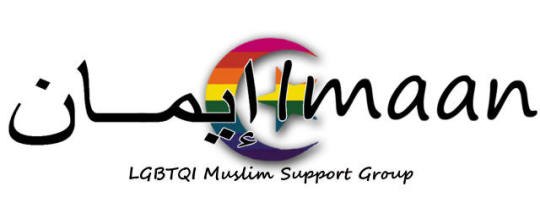
The group was started as a branch of Al-Fatiha Foundation in London in 1998, after its American members visited London. Later the group evolved into Imaan in 1999. Farzana/Faizan Fiaz,Adnan Ali,Azeem Ahmad,Ubaid co-founded the organization. The word ''Imaan'' means faith in Arabic. Imaan served as a peer-support network, and was a meeting place for people to pray together,celebrate Islamic holidays. Imaan hosted several conferences that deal with such topics as culture,Islamaphobia, non-Muslim partners,HIV and Islam, relatives of gay Muslims, & transsexual Muslims.



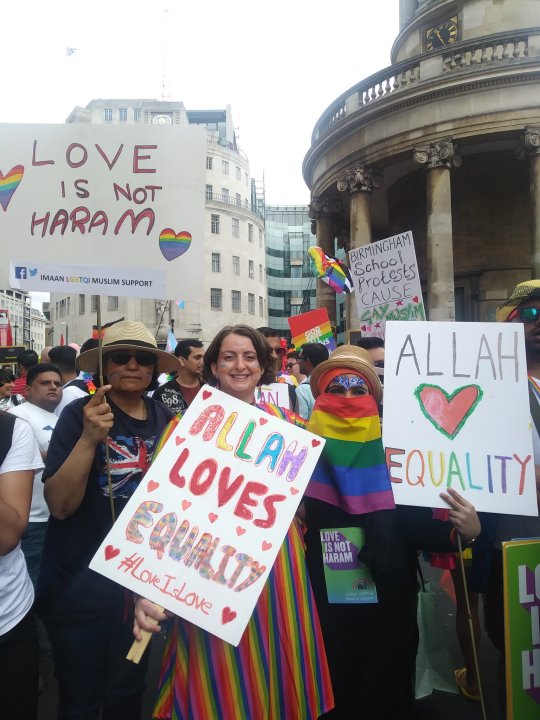

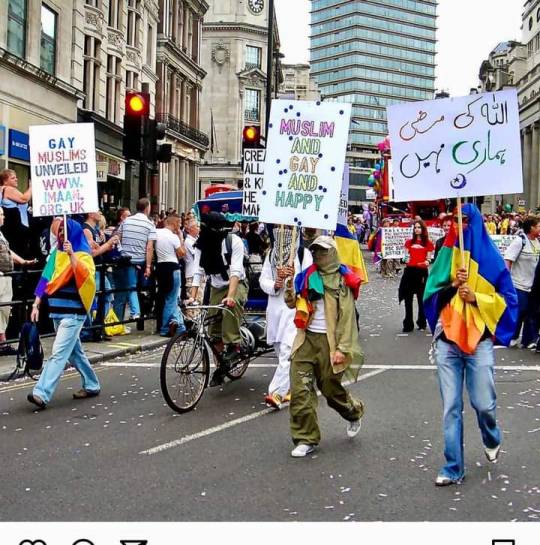
Imaan Fest
On 11th April 2020, Imaan's members decided to organize UK's first LGBTQI+ Muslim Pride festival.But it was postponed for Corona & took place in December.
#imaan LGBTQ#queer muslim#lgbtqi muslims#lgbtqia+ muslims#gay muslim#bi muslim#queer islam#intersectionality
11 notes
·
View notes
Text
Kelma Association
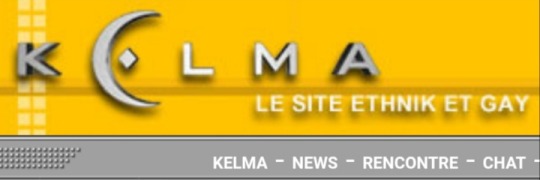
Type : Non-profit
Founder : Fouad Ziraoui
Mission : to bring together Maghreb homosexuals around cultural and convivial activities,raising awareness for Maghreb LGBTQ+ members.
Year of foundation : 1996
Country : France
Website :web.archive.org/web/20040618064658/http://www.kelma.org/
Kelma was a non-profit organization for gay muslims & queer immigrants of North African origin (including Egypt,Libya,Algeria, Tunisia,Western Sahara,Morocco,Mauritania, Somalia,Mali,Djibouti). In Arabic Kelma means ''Word''. The organization's activities are miscellaneous.Many of its members preferred to remain strictly anonymous,for the fear of exclusion from their own family and communities.
Kelmahgreb - Mahgreb's first online gay magazine was launched by Kelma. The site was a hub of various informations, leisure, discussion forums for North African/ethnic gays and gay muslims.The site has been subject to censorship in Morocco,Algeria & Tunisia.
History
In 1996, Algerian gay activist Fouad Ziraoui founded the Kelma association.Its primary purpose was the visibility of gays of North African origin & the fight against the ostracism within broader population.Since 1997, it became known for the organization of the Black Blanc Beur (BBB) evenings in Paris at the Folies Pigalle.Kelma and its BBB evenings were aimed in particular at North African & Black gays who do not know where to turn.North Africans gays were in fact not only victims of the distrust of their neighborhoods and their families, but also of discrimination in more “classic” Parisian nightclubs. Gradually Kelma association refocused its activities to meet the needs of its members and more interested in the conviviality of the party than LGBTQ activism.[citation needed]
Kelma was reluctant to engage in pride parades, as its members wished to avoid attention from broader population.However, they participated in the fight against AIDS among North African homosexuals in France.Kelma also raised awareness on various things, including the situation of LGBTQ in Maghreb.Kelma Association were among the first to spread information about 2001's Queen Boat incident that took place in Cairo,Egypt.
#gay muslim#african#queer africa#queer arab#intersectionality#black#qpoc#gay bear#black bear#homosexual#MENA
10 notes
·
View notes